Illuminate your understanding of the Bible by exploring the fascinating concept of 'Eucatastrophe', revealing unexpected joy in tales of biblical catastrophe.
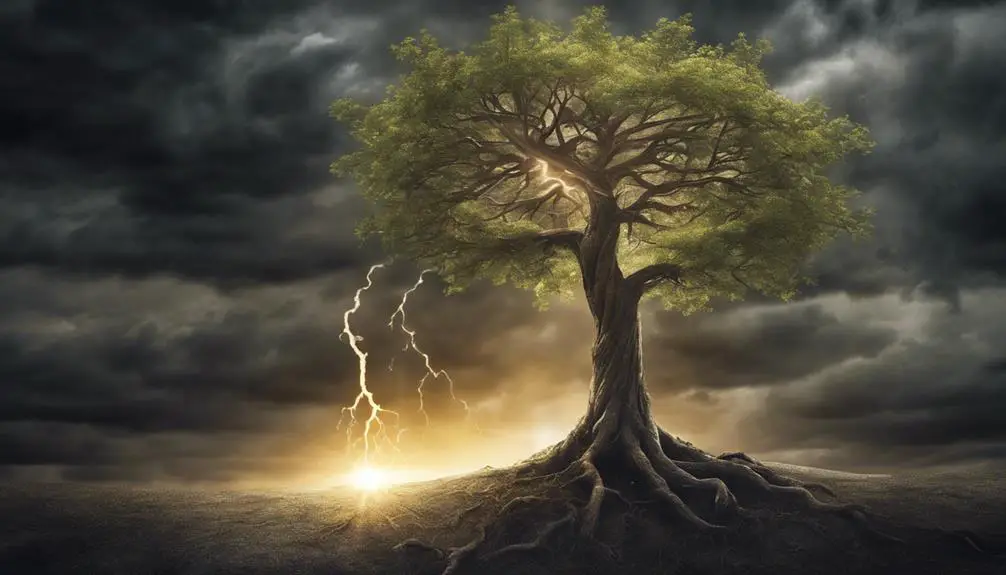
Eucatastrophe in the Bible
Imagine, for a moment, that you're standing at the edge of the most profound discovery in literary analysis.
You've cracked open the Bible, a text brimming with tales of suspense, wonder, and sudden, joyous resolution – a concept aptly termed 'Eucatastrophe' by literature titan, J.R.R. Tolkien.
How does this idea of a 'good catastrophe' apply to the biblical narratives you're familiar with?
Stick around, and let's sift through these ancient pages together, uncovering a fresh perspective on stories we thought we knew.
Key Takeaways
- Eucatastrophe, a concept coined by Tolkien, is a prevalent theme in biblical narratives, symbolizing divine intervention and hope in adversity.
- Stories of Noah, Moses, and Daniel showcase eucatastrophe, where their faith and God's intervention lead to positive resolutions.
- Critics argue that eucatastrophe may oversimplify narratives, but its representation of hope and divine intervention resonate deeply.
- The resurrection of Jesus is the ultimate eucatastrophe, affirming life's transformative possibility and the power of God to bring good out of evil.
Understanding Eucatastrophe: A Brief Overview
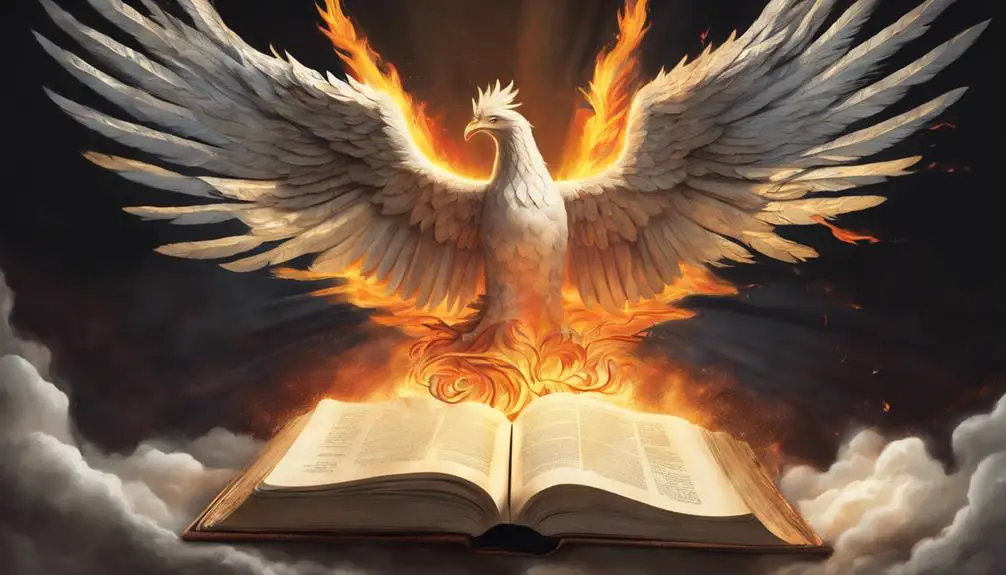
To fully grasp the concept of eucatastrophe, you need to delve into its origins and understand how it's intricately woven into the fabric of narratives, particularly within the theological context of the Bible. The term 'Eucatastrophe Origins' was coined by J.R.R. Tolkien, a devout Catholic, who saw this narrative device as a reflection of divine intervention or God's grace in literature. He perceived it as a sudden turn of events leading to a positive resolution, an unexpected salvation, often linked to the protagonist's faith or actions.
However, 'Eucatastrophe Criticism' argues that such an abrupt happy ending can diminish the complexity of the narrative and the characters' development, making the story less relatable or realistic. Critics argue it can oversimplify the theological principles at play, reducing them to mere plot devices.
Yet, in a theological context, eucatastrophe can be seen as a manifestation of divine providence, a testament to the belief that even in the direst situations, God can bring about a sudden, joyful resolution. It's a hopeful premise that resonates deeply with the Biblical narrative, revealing an underlying optimism in the face of adversity.
Eucatastrophe in the Story of Noah
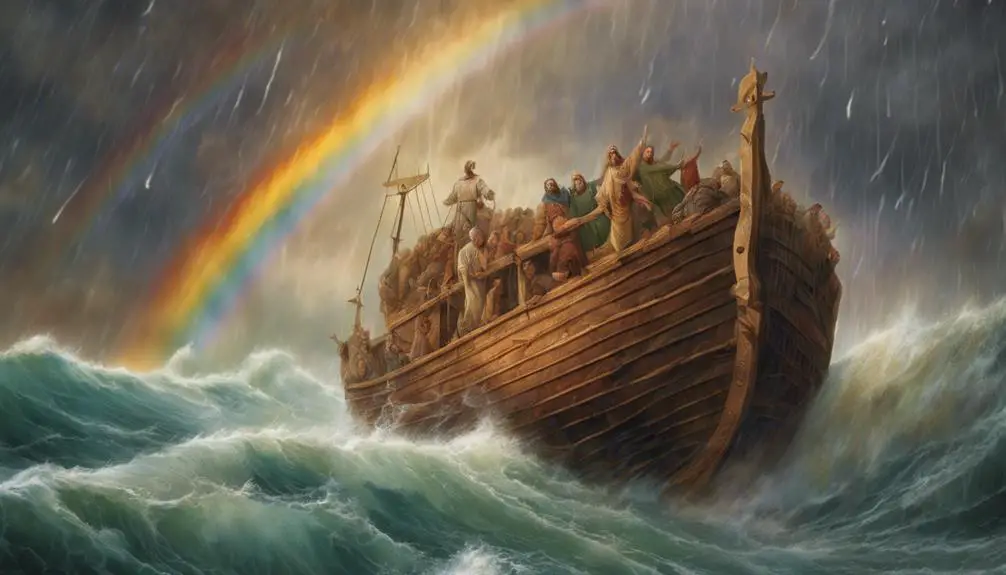
Often, you'll find the concept of eucatastrophe beautifully illustrated in the Biblical story of Noah, where divine intervention leads to an unexpected yet joyous resolution against all odds. Noah's faithfulness to God, despite the ridicule and isolation, sets the stage for this divine narrative of redemption and hope.
Here's a brief analysis:
Aspect |
Description |
Implication |
|---|---|---|
Noah's Faithfulness |
He obeyed God's command to build an ark, despite the impossibility of the situation. |
His faith was rewarded. His family and the animals were saved. |
Divine Intervention |
God sends the flood, but also ensures Noah's survival. |
God's justice and mercy are displayed. |
Eucatastrophe |
The flood seems catastrophic, but it cleanses the world, setting the stage for a new beginning. |
Shows God's power and plan to bring good out of evil. |
You might think, "It's just an old story." But, isn't it more than that? It's an account of faith, divine intervention, and eucatastrophe. It's a message that resonates even today: despite the darkest hours, there's always hope for an unexpected, joyous resolution.
Eucatastrophe in the Exodus Narrative
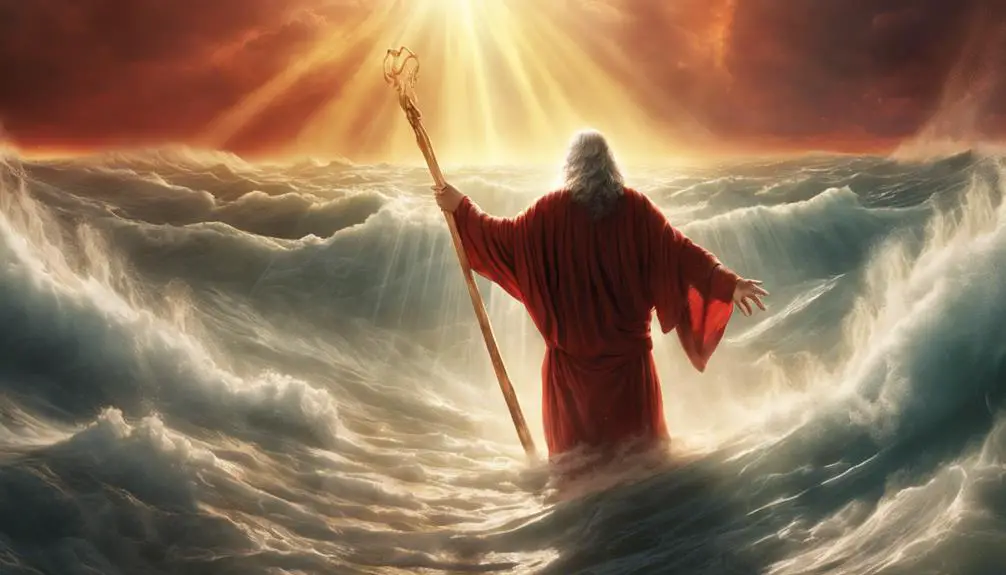
Just as Noah's narrative illuminates the concept of eucatastrophe, the Exodus story offers another profound example of this phenomenon, where God's intervention brings forth unforeseen joy from imminent disaster. Consider Moses' leadership. Seemingly insurmountable obstacles, like the Red Sea, were overcome through divine intervention, turning despair into jubilation.
Through a detailed reading, you can discern a pattern of eucatastrophe throughout the Exodus narrative. God repeatedly rescues the Israelites from the brink of disaster, such as the plagues on Egypt and the parting of the Red Sea. Each event is a powerful demonstration of eucatastrophe – a sudden, positive reversal of circumstances.
At the heart of this narrative is Pharaoh's downfall. The once mighty ruler's power is diminished, culminating in the drowning of his army in the Red Sea. This catastrophic event for Pharaoh is a eucatastrophe for the Israelites, embodying the essence of this concept. This unexpected deliverance solidifies their faith in God's providence.
Therefore, the Exodus narrative isn't just a historical account but a theological exposition of eucatastrophe, showing God's power to transform dire situations into moments of unexpected joy.
Eucatastrophe in the Story of Daniel
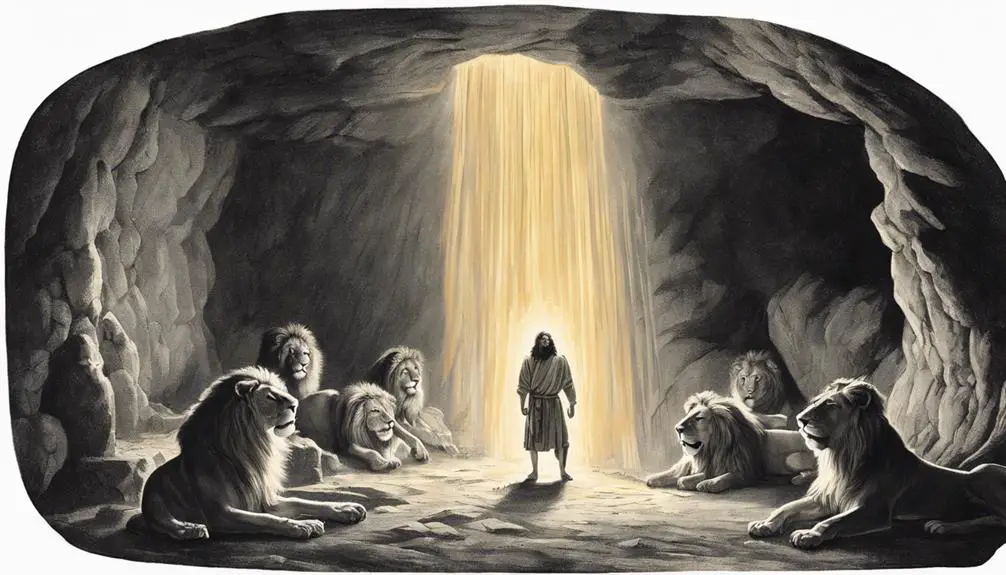
Delving into the narrative of Daniel, you'll discover an archetypal manifestation of eucatastrophe, illustrating God's power to transform imminent disaster into unexpected salvation. The story unfolds as Daniel, an Israelite, is thrown into a den of lions as a result of his unwavering faith in God. Yet, the impending doom turns into a miraculous deliverance, often referred to as the Lion's Den miracle.
In the face of almost certain death, Daniel's faith remained steadfast. This faith, coupled with God's intervention, turned a catastrophic end into a surprising victory. The depth of Daniel's faith and the intensity of the miracle are powerfully portrayed in the biblical narrative.
To further engage your understanding, consider the table below:
Aspect |
Catastrophe |
Eucatastrophe |
|---|---|---|
Setting |
Lion's Den |
Lion's Den |
Threat |
Death by Lions |
Nullified by God |
Outcome |
Expected Death |
Miraculous Survival |
Key Player |
Daniel |
Daniel |
Divine Intervention |
None |
Rescue from Death |
This table clearly depicts how a seemingly hopeless situation was transformed into a powerful testament of faith and divine intervention. Thus, the story of Daniel showcases a poignant instance of eucatastrophe in biblical literature.
The Ultimate Eucatastrophe: The Resurrection of Jesus
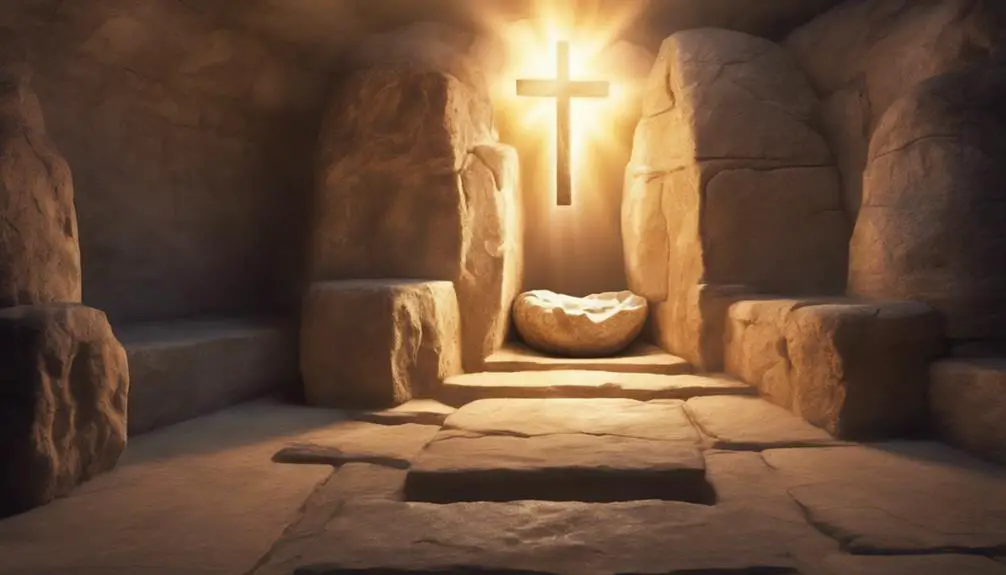
In the grand tapestry of biblical narratives, the resurrection of Jesus Christ stands as the ultimate eucatastrophe, culminating in a transformative event that redefines the very concept of triumph over tragedy. You see, in its profoundest depth, the resurrection significance lies not only in the victory over death but also in the affirmation of life's transformative possibility.
The redemption theory posits that Christ's resurrection signals the redemption of humankind from the bondage of sin. It's a divine intervention, a sudden and joyous turn of events that embodies the essence of a eucatastrophe. It's a cataclysmic shift from despair to hope, from death to life, from defeat to victory, resonating the power of God's love for humanity.
In the resurrection, you encounter the ultimate demonstration of God's power to bring life out of death, hope out of despair, and good out of evil. It's an event that not only alters the narrative of human existence but also redefines the paradigm of faith. It's the ultimate eucatastrophe that illuminates the path to salvation and eternal life, underscoring the transformative potency of divine love.
Frequently Asked Questions
What Is the Origin of the Term 'Eucatastrophe' and Who First Used It?
You're delving into the term 'eucatastrophe,' aren't you? It was first coined by J.R.R. Tolkien, a renowned author.
This term symbolizes a sudden turn of events that ensures the protagonist doesn't meet some impending doom.
It's often seen in folklore where the hero unexpectedly survives against all odds.
Now, isn't this an intriguing concept to explore further?
Are There Any Examples of Eucatastrophe Outside of the Bible, in Other Religious Texts or in Secular Literature?
Yes, you'll find examples of eucatastrophe in other religious texts and secular literature too. It's not exclusive to the Bible. You'll see it in mythology where unexpected positive turns happen in dire situations.
Similarly, eucatastrophe appears in film, often creating dramatic climaxes that delight viewers. This concept transcends religious context, showcasing the universal appeal of sudden joyous turnarounds in storytelling.
How Is the Concept of Eucatastrophe Used or Interpreted in Modern Christianity?
In modern Christianity, you'll find eucatastrophe symbolism as a tool for interpreting life's trials. It's about viewing challenges as moments before a great turnaround, much like Christ's resurrection.
You'll see it as a thematic undercurrent in sermons and Christian literature. From this faith perspective, it's not just a literary device but a lived reality, shaping how you handle adversity with hope and resilience.
Are There Any Criticisms or Controversies Surrounding the Concept of Eucatastrophe in Biblical Interpretation?
Yes, there are disagreements over the interpretation of eucatastrophe in the Bible. Critics argue it can lead to misinterpretations, oversimplifications, or the romanticizing of biblical events.
They claim it might encourage a selective reading of scriptures, focusing on positive outcomes while ignoring harsh realities.
You'll find that some theologians strongly advocate for a more balanced, nuanced approach to biblical interpretation, rather than relying solely on the concept of eucatastrophe.
How Does the Concept of Eucatastrophe Relate to the Overall Theme of Redemption in the Bible?
You'll find redemption symbolism throughout the Bible. This overarching theme presents eucatastrophe implications – moments of sudden, unexpected joy. Imagine the prodigal son's return or Christ's resurrection; these are eucatastrophes, turning despair into hope and signifying divine redemption.
They're not just happy endings, but profound transformation points, embodying the Bible's message of redemption. So, eucatastrophe relates directly to redemption, highlighting the power of divine grace in the darkest moments.
Conclusion
In conclusion, you've seen that eucatastrophe isn't a foreign concept to the Bible. It's woven into Noah's ark story, the Exodus, Daniel's ordeal, and supremely in Jesus' resurrection.
These moments of sudden joyous turn aren't just happy endings, they're divine interventions. They remind us of God's merciful nature, His power to flip scripts, and His ultimate victory over despair.
So, whenever you're encountering a bleak situation, remember the eucatastrophe waiting to unfold.

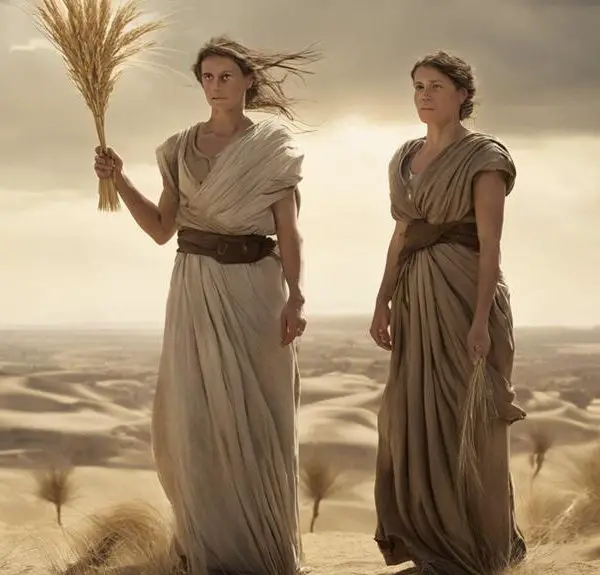
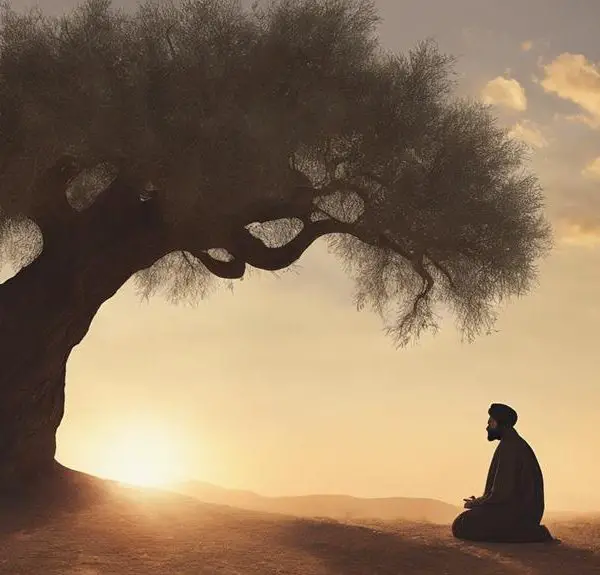
Sign up